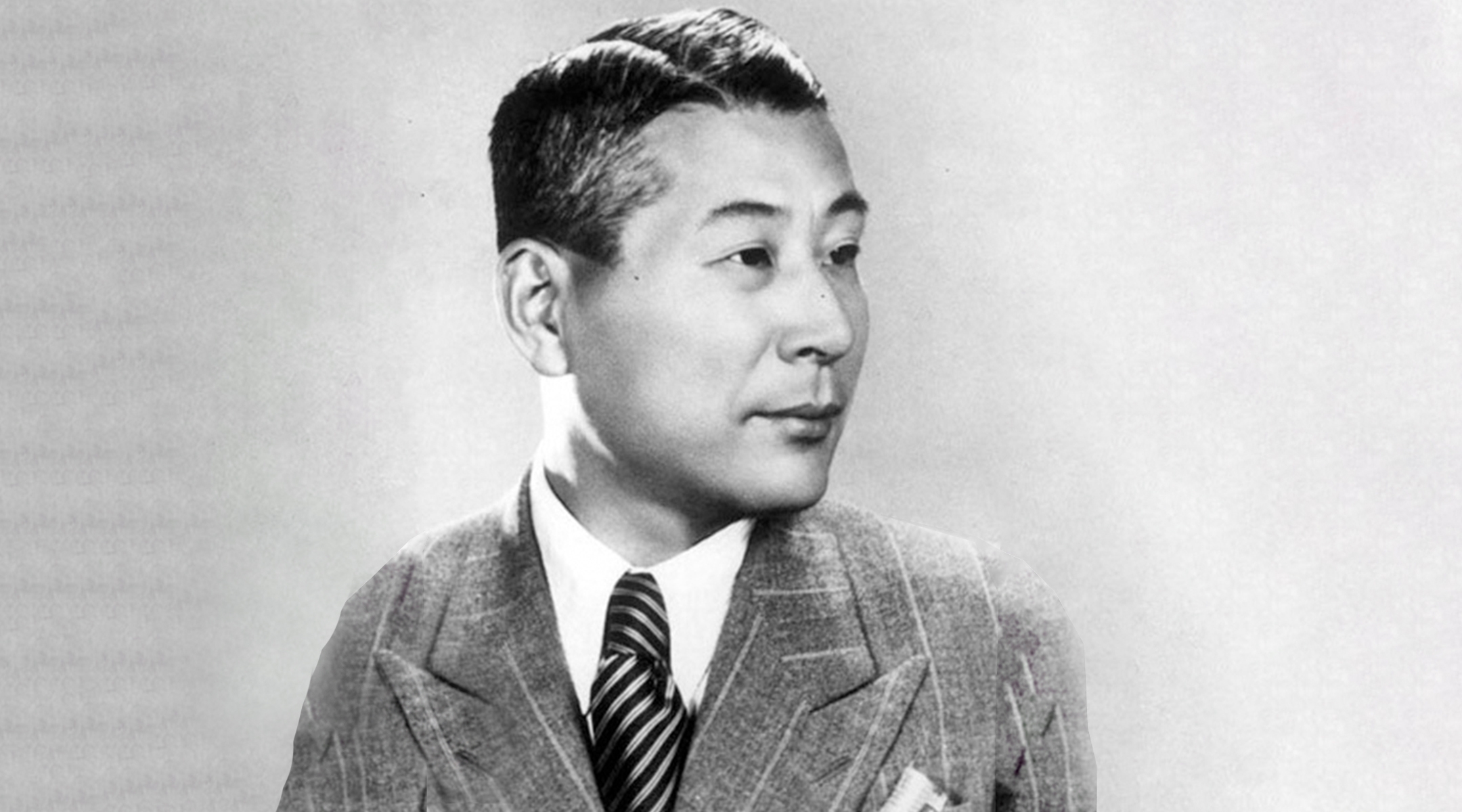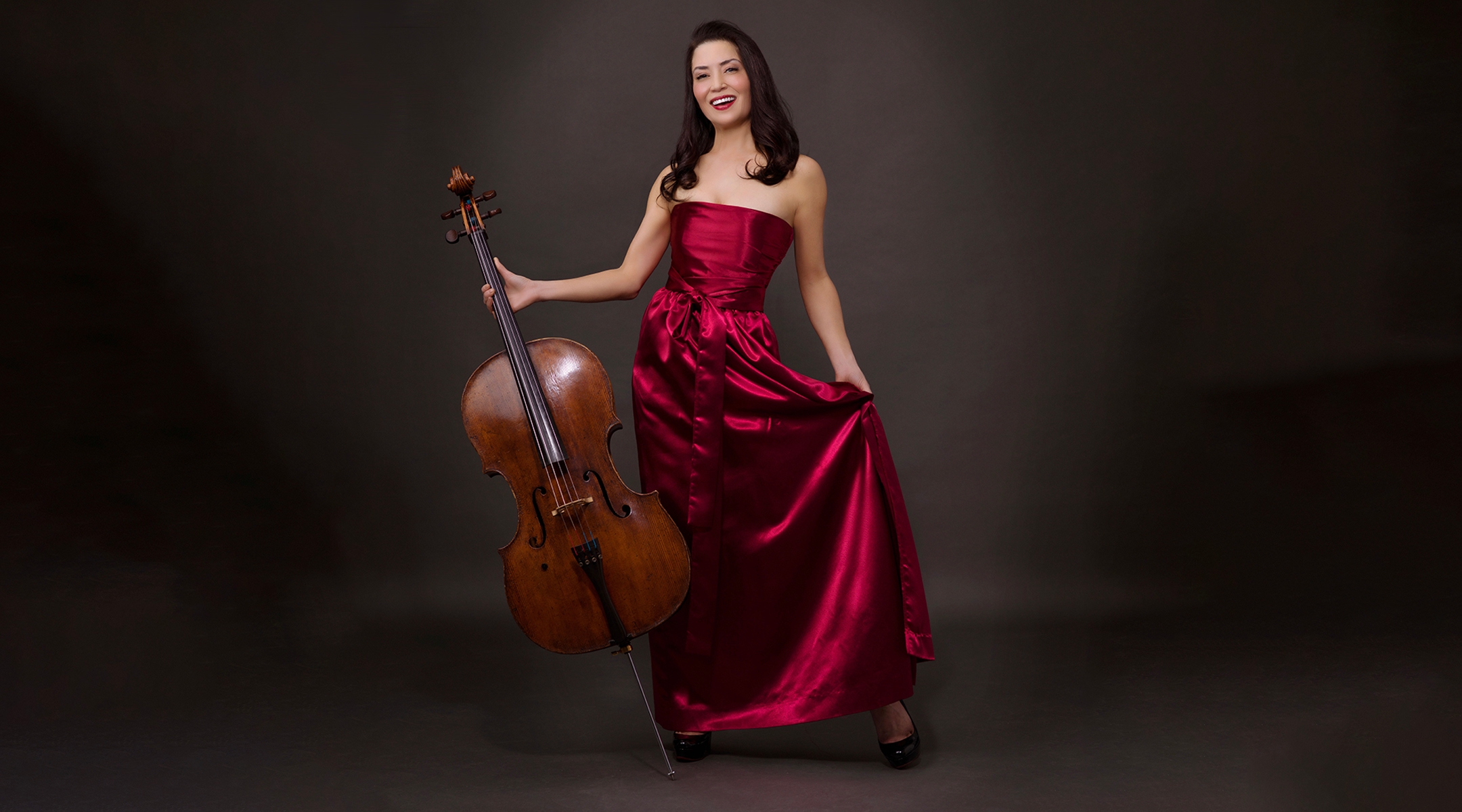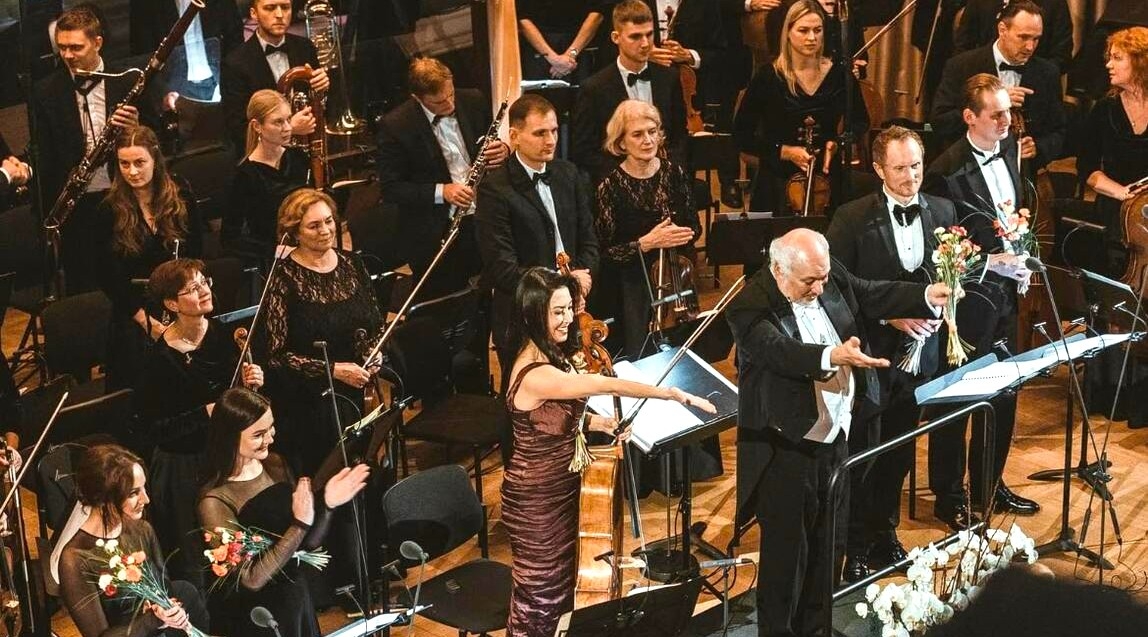For most of his life, Chiune Sugihara received little recognition for the dramatic actions he undertook as Japanese vice-consul to Lithuania on the eve of World War II: the rescue of some 6,000 Jews from Poland and elsewhere from the Nazi death machine.
For decades, the Jewish world remained largely ignorant of his heroism. When, in 1985, Yad Vashem, the World Holocaust Remembrance Center located in Israel, honored the unassuming retired diplomat as a Righteous Among the Nations, Sugihara was too old and sick to travel to Jerusalem to accept the award. He died shortly after.
But his renown has grown in the years since his death, and now Sugihara is being celebrated in a new way with an extraordinary piece of music composed to commemorate his heroic actions.
On April 19 at Carnegie Hall, Japanese-American-Israeli cellist Kristina Reiko Cooper will perform this original piece of music — Lera Auerbach’s Symphony No. 6, “Vessels of Light” — accompanied by the New York City Opera Orchestra conducted by Constantine Orbelian.
The gala concert, organized by Yad Vashem and the American Society for Yad Vashem, which commissioned the piece, will pay tribute to Sugihara’s legacy.
Along with the honorary Dutch consul in Lithuania, Jan Zwartendijk, Sugihara issued life-saving visas to the Jews trying to escape Europe through a complex, illegal scheme involving fake transit visas via Japan to the Dutch-speaking Caribbean island of Curaçao.
Not a single Jew actually traveled to that faraway island off the coast of Venezuela, home to the oldest surviving synagogue in the Americas. But the operation — carried out under the noses of Lithuania’s Nazi occupiers — enabled thousands of Jews to resettle in Shanghai, leading to eventual freedom.
“Being half-Japanese myself, I understand the culture, and I know as a Japanese person that opposing authority goes against every fiber of our being,” Cooper, the cellist, said this month in an interview near her home in Tel Aviv. Born in New York to a mother of Japanese descent, Cooper later converted to Judaism and moved to Israel. She and her husband, Leonard Rosen, are raising their three children as Orthodox Jews.
“Everybody’s heard of Schindler, who had a factory. But Sugihara had nothing to gain from this. In fact, he had everything to lose,” said Cooper, a visiting professor of music at Tel Aviv University. “He didn’t want recognition and never spoke to anybody about it. He didn’t even know that he had saved anybody until the very end of his life.”

Japanese diplomat Chiune Sugihara saved thousands of Jews during the Holocaust. (Courtesy of Yad Vashem)
Cooper, who studied at Julliard and comes from a long line of musicians — her father is a pianist and her mother a violinist and former concertmaster of the American Symphony — has a special personal connection to the Sugihara story.
Her husband’s father, Irving Rosen, was one of the Jews whose lives was saved by Sugihara’s actions. Armed with papers enabling Rosen’s family to leave Lithuania and emigrate to Curaçao via Japan, Rosen and a brother traveled via the Trans-Siberian Railway from Vilnius to Moscow to Vladivostok, then by sea to Japan — and eventually Shanghai. Most other members of their family were killed by the Nazis.
“I became obsessed with this story and wanted people to know about it, especially given everything that’s going on in the world with the rise of authoritarian governments, mass dislocations, refugees, wars, rising antisemitism and anti-Asian hate,” Cooper said. “I’m not a writer, a filmmaker or an actress. I’m a musician. People had asked me, ‘Why not put together a nice concert in tribute to Sugihara?’ But I wanted to write something that could last forever.”
With the backing of Yad Vashem and the American Society for Yad Vashem, Cooper asked Auerbach to write the piece, a 40-minute composition for solo cello, choir and orchestra involving 130 performers, including Yiddish “whisperers,” allusions to Psalm 121 and an introductory piece by Japanese composer Karen Tanaka titled “Guardian Angel.”
At Carnegie Hall, Cooper, who plays on an Italian-made Guadagnini cello from 1743, will perform Auerbach’s moving, large-scale symphonic work as a soloist. She’ll also perform in Prague on March 27, Los Angeles on May 18, in California’s Napa Valley on July 18 and in Warsaw on October 8.
“Most people do not pay attention to history, because they’re so wedded to current events,” said the Carnegie Hall event’s co-chair, Peter Till, a board member of the American Society for Yad Vashem. “But this is even more relevant today because of the rise of extremist hate groups. They’ll forever deny that it exists, or ignore it, or say it couldn’t happen here, but hate continues to repeat itself and people have to face up to it.”
The Sugihara story is especially compelling, Till said, because it’s the first event of its kind that links Holocaust survivors with Asia in general — and Japan in particular.
“This is as much about the music as it is an expression of humanity, of people from diverse cultural backgrounds coming together to save lives,” he said. “For Yad Vashem, this is a very important event because it shows the depth of understanding.”
Of the roughly 28,000 non-Jews who’ve been designated by Yad Vashem as Righteous Among the Nations, only 40 were diplomats. Sugihara is the only Japanese citizen so honored.

Japanese-American-Israeli cellist Kristina Reiko Cooper has a special personal connection to the Sugihara story. (Vardi Kahana)
“On the whole, the eligibility process for diplomats is slightly different than for ordinary rescuers, because they had immunity,” said Joel Zisenwein, director of Yad Vashem’s Righteous Among the Nations Department. “In most cases, they were not at physical risk. But many of them had defied the guidelines and official policies of their foreign offices. Sugihara is even more interesting because he represented an ally of Nazi Germany.”
Zisenwein said Sugihara provided between 2,100 and 3,500 transit visas, though the exact number is not known.
“Literally, all rescuers from the Holocaust era have passed away, so people accepting the award are generally descendants or even grandchildren of the recipients,” Zisenwein said. “It’s interesting that Sugihara received his award for actions prior to the German invasion of Lithuania. Most of the Jews he rescued were Polish refugees who had fled there in 1939. Many countries claim to have their own ‘Schindlers.’ But here indeed was an individual who saved thousands of Jewish lives.”
The evening’s master of ceremonies will be Zalmen Mlotek, who is also artistic director of the National Yiddish Theatre Folksbiene. Tickets and sponsorships are still available for the event.
“It’s not just the people Sugihara saved. It’s the worlds of those thousands of people,” said Mlotek, whose father, Joseph Mlotek, was a 21-year-old Yiddish poet working at a newspaper in Warsaw when World War II broke out. After fleeing to Lithuania, the family heard about Sugihara and was able to obtain transit visas to Shanghai, where the elder Mlotek and his brother Abram spent the war years.
“My father became a Yiddish activist here in New York and set up a network of 200 Yiddish schools all over the country. He published books with my mother and did concert tours for Yiddish musicians,” said Mlotek, 71. “I look at myself today, as artistic director of the Yiddish theater for 20 years, carrying on this same legacy that would have been decimated had it not been for the heroism of Sugihara.”
Auerbach’s composition had its world premiere last November in the Lithuanian city of Kaunas (known in Yiddish as Kovno), where Sugihara’s story took place. Additional performances are scheduled for cities around the world through 2024.
JTA has documented Jewish history in real-time for over a century. Keep our journalism strong by joining us in supporting independent, award-winning reporting.
This story was sponsored by and produced in collaboration with the American Society for Yad Vashem, which promotes Yad Vashem’s mission of Holocaust education, research, documentation and commemoration, engaging a broad community of caring individuals to learn about the Holocaust and keep its memory and lessons alive. This article was produced by JTA's native content team.
More from American Society for Yad Vashem





